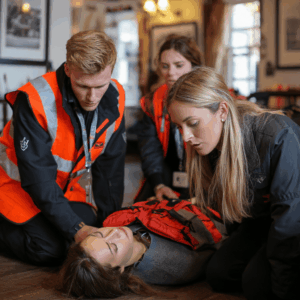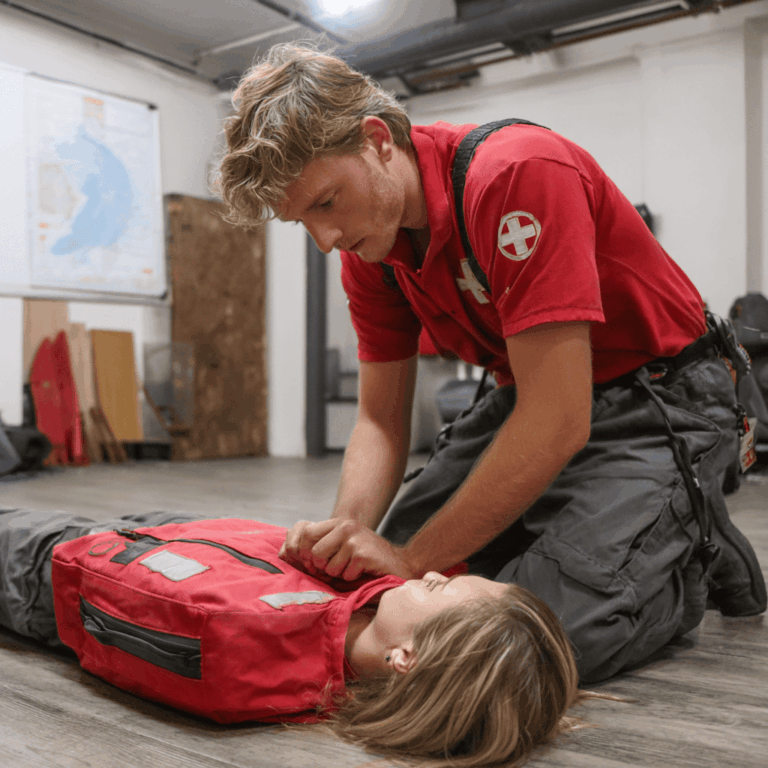It’s a quiet fear that lives in the back of many of our minds. What if something happens? What if a loved one chokes at dinner? What if I witness an accident and feel utterly helpless? This anxiety is born from a place of deep care, but it can feel paralyzing. The good news is that this worry doesn’t have to be your final answer. It can, in fact, be the very catalyst for one of the most empowering journeys you’ll ever take. The path from feeling anxious to becoming truly assured is clearer than you think, and it begins in a supportive, practical Manchester first aid class. By taking a positive step with a provider like https://manchesterfirstaidtraining.co.uk/, you aren’t just learning a skill—you are systematically dismantling fear and replacing it with capability, transforming your “what if” into a powerful “I know how.”
Understanding The Fear: The Roots Of Our Anxiety
 To transform fear, we must first understand it. The anxiety surrounding emergencies typically stems from three core places: the fear of the unknown, the fear of making things worse, and the fear of the intense emotions involved. When we don’t know what to do, a situation feels chaotic and overwhelming. Our brain, seeking to protect us, screams “Danger!” and can trigger a freeze response. We worry that our lack of knowledge will lead us to do the wrong thing, causing more harm. And we are intimidated by the sight of blood, the stress of the moment, or the perceived gravity of the responsibility.
To transform fear, we must first understand it. The anxiety surrounding emergencies typically stems from three core places: the fear of the unknown, the fear of making things worse, and the fear of the intense emotions involved. When we don’t know what to do, a situation feels chaotic and overwhelming. Our brain, seeking to protect us, screams “Danger!” and can trigger a freeze response. We worry that our lack of knowledge will lead us to do the wrong thing, causing more harm. And we are intimidated by the sight of blood, the stress of the moment, or the perceived gravity of the responsibility.
A high-quality Manchester first aid class is specifically designed to address each of these fears head-on, not with theory, but with practical, hands-on solutions. It pulls back the curtain on the unknown, making the mysterious manageable.
The First Transformation: Knowledge As Your Anchor
The moment you step into a first aid training session, the transformation begins. The first and most powerful tool you receive is knowledge. This isn’t about memorising a dry textbook; it’s about understanding the “why” behind the actions. You learn how the human body works under stress and the simple, logical steps that can keep someone alive and stable.
For example, learning the straightforward principles of DR ABC (Danger, Response, Airway, Breathing, Circulation) gives you a mental checklist. This checklist becomes your anchor in a storm of panic. Instead of a chaotic, terrifying event, a medical situation becomes a series of questions you are trained to ask and answer: “Is the scene safe?” “Can they hear me?” “Are they breathing?” This structure is incredibly calming. It provides a clear path forward when emotions are running high, replacing the chaos of the unknown with the clarity of a proven process. Knowledge, in this context, is the ultimate antidote to anxiety.
The Power Of “Muscle Memory”: Building Confidence In Your Hands
There is a profound difference between knowing something in your head and knowing it in your hands. This is where the magic of practical training truly shines. A significant portion of a great first aid course is dedicated to doing. You will practice CPR on a mannequin, feeling the correct rhythm and depth of chest compressions. You will apply bandages, put people into the recovery position, and even practice using a defibrillator (AED).
This repetitive, hands-on practice builds what is known as “muscle memory.” You are training your body to remember the actions, so that in a moment of high stress, it can recall the feeling of having done it correctly before. This is a game-changer for confidence. The fear of “I might do it wrong” is systematically erased through positive repetition. You leave the class not just thinking, “I know how to do CPR,” but knowing you can physically perform the actions because you have done it, again and again, in a safe and supportive environment. This embodied confidence is unshakeable.
From Panic To Purpose: Rewiring Your Instincts
Currently, your instinct in the face of an emergency might be to panic or freeze. First aid training works to rewire that instinct. Through scenario-based learning and supportive guidance from instructors, you are gently exposed to simulated pressures in a controlled setting. You learn to take a deep breath, assess the scene, and step into a role of purposeful action.
This shift—from a potential victim of circumstance to an active, capable responder—is profoundly empowering. It changes your self-perception. You begin to see yourself as someone who can handle pressure, who can lead when needed, and who can be a source of calm for others. This newfound identity isn’t confined to medical emergencies. It spills over into your daily life, making you more assertive in meetings, more resilient in the face of personal challenges, and more confident in your ability to handle whatever life throws your way. You trade a narrative of fear for one of capability.
Your Journey To Assurance Starts With A Single Step
The journey from anxiety to assurance is one of the most positive investments you can make in yourself. It’s a decision to take control, to replace fear with ability, and to transform your care and concern into tangible power. The right training provider creates an environment that is encouraging, engaging, and free from judgment. You learn alongside others who share similar fears and aspirations, guided by experts who are passionate about empowering people.
Don’t let your anxiety be the end of the story. Let it be the beginning of a more confident, capable, and assured you. By booking a Manchester first aid class, you are choosing to arm yourself with the knowledge, the practical skills, and the profound self-belief that you can make a difference. You are choosing to be the calm, capable person in the room. Take that first step, and watch as your fear transforms into one of your greatest strengths.



Comments are closed.